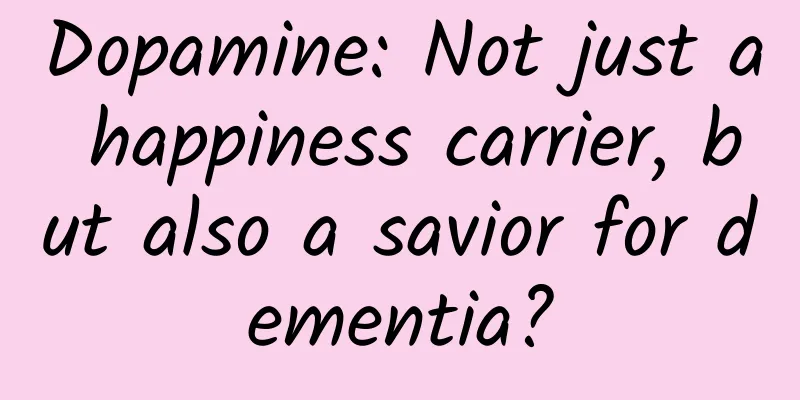Dopamine: Not just a happiness carrier, but also a savior for dementia?

|
Dopamine's many roles: from everyday pleasure to potential for Alzheimer's treatment Dopamine, a neurotransmitter, has become very popular recently. When it comes to it, people think of stimulation, happiness, positive feedback, excitement and happiness. Dopamine color matching, dopamine outfits, and dopamine foods have also frequently become hot searches. People are eager to get a little low-cost stimulation and happiness in their busy and stressful daily lives. Dopamine is also a key drug in clinical practice. Unlike the excitement and happiness it brings to people in daily life, dopamine plays a life-saving role in clinical practice. Dopamine was first used clinically as a drug in the 1960s to treat acute circulatory problems such as severe hypotension, heart failure and shock. Initial research and clinical applications focused on its effects on the cardiovascular system. Different doses of dopamine injected intravenously have different effects on the circulatory system, mainly regulating the contraction and expansion of blood vessels, affecting blood pressure and cardiac output, and improving blood flow to different organs, especially the kidneys. Of course, as an important neurotransmitter, dopamine plays an even more important role in the nervous system. Neurotransmitters are chemical substances transmitted between nerve cells when they communicate with each other. Our nerve cells can release a variety of neurotransmitters, such as dopamine related to reward, motivation, emotion regulation, and motor control, serotonin related to regulating emotions, sleep, appetite, and cognitive functions, and gamma-aminobutyric acid, which is involved in inhibitory neurotransmitters and helps reduce overexcitement of neurons. Any neurotransmitter that is secreted insufficiently or excessively will cause neurological problems. Dopamine disorders are closely related to neuropsychiatric diseases such as Parkinson's disease, depression, and schizophrenia. Many clinical drugs treat neurological diseases by regulating the concentration of dopamine or by affecting the release and reception of dopamine. For example, Parkinson's disease patients usually suffer from movement disorders due to damage to neurons that release dopamine. Dopamine prodrugs (such as levodopa) or dopamine agonists are used clinically to supplement dopamine. Schizophrenia is associated with overactive dopamine, leading to symptoms such as delusions and hallucinations. In response to this, a variety of antipsychotic drugs (such as clozapine, risperidone, olanzapine, etc.) reduce the effects of dopamine by blocking dopamine receptors. The latest research from the RIKEN Brain Science Center has expanded the role of dopamine to a new direction - dopamine treatment for Alzheimer's disease. Alzheimer's disease (AD) is a neurodegenerative disease characterized by the gradual deterioration of memory, thinking and behavior. Beta-amyloid (Aβ) plaques are a common feature of the brains of Alzheimer's patients. Aβ plaques are formed by abnormal protein folding and aggregation, which hinder the normal signal transmission between neurons and even cause neuronal damage and death. At present, the drugs for treating Alzheimer's disease mainly focus on relieving symptoms, slowing the progression of the disease and improving the quality of life of patients. Among them, anti-amyloid drugs are the focus of current drug research and development, aiming to reduce or remove beta-amyloid in the brain and restore signal transmission between neurons. Aducanumab (trade name Aduhelm) and Lecanemab (trade name Leqembi), two antibody drugs for beta-amyloid, were approved by the FDA in 2021 and 2023 respectively for the treatment of Alzheimer's disease. Their effectiveness in clinical practice remains to be seen. Another characteristic of Alzheimer's patients is that they have low levels of dopamine, so the research team of the Japan Brain Science Center raised a question: if dopamine is supplemented for Alzheimer's patients, will it have an impact on the disease? They used elderly mice as research subjects and injected the dopamine precursor L-DOPA intraperitoneally. After 3 days of treatment, they found that the dopamine precursor could induce the decomposition of β-amyloid protein in the brain and improve the cognitive function of mice, suggesting that regulating dopamine may have potential in the treatment of Alzheimer's disease. Of course, this treatment has not been clinically validated, and how dopamine affects the breakdown of beta-amyloid protein also needs further study. Although regulating the concentration and effect of dopamine is a common method for treating mental illness in clinical practice, improper use will still have side effects that cannot be ignored. For example, long-term use of levodopa may cause involuntary convulsions, hallucinations, delusions, low blood pressure or syncope. Any clinical intervention for Alzheimer's disease (AD) should be personalized according to the status of the treatment subject to optimize the treatment effect and minimize side effects. This article is a work supported by the Science Popularization China Creation Cultivation Program Author: Zhao Bei Reviewer: Gui Yaxing, Chief Physician, Department of Neurology, Shanghai First People's Hospital, Shanghai Jiao Tong University Produced by: China Association for Science and Technology Department of Science Popularization Producer: China Science and Technology Press Co., Ltd., Beijing Zhongke Xinghe Culture Media Co., Ltd. |
Recommend
Analyzing the reasons for the popularity of "Story of Yanxi Palace" from four perspectives of Internet operations
This article mainly analyzes the reasons for the ...
323 World Meteorological Day | Interesting facts about typhoons: just read this article!
In a few months, the typhoon season will come one...
Drink bone soup to supplement calcium? This article tells you how effective it is
Can bone soup provide calcium? The calcium in bon...
Want to eat all the crayfish? First figure out: where are you eating crayfish from?
Recently, although the temperature has repeatedly...
When did Audi start making new energy vehicles? The answer is 100 years ago!
It is inevitable for luxury brands to enter the e...
Sir Tang said: Live Screen Recording Column + Live Streaming Required Column
Sir Tang said: Live Screen Recording Column + Liv...
Dai Rao’s personal profile: How to distribute traffic effectively after achieving SEO optimization results on the website?
When traffic comes, it is something that every SE...
Summary of new features in iOS 10.3: AirPods can also locate and sound when lost
Apple released the first developer beta of iOS 10...
From rejection to acceptance, Chanel also started to engage in e-commerce
Chanel, a luxury brand that has always been again...
10 things to note when increasing downloads of your startup app in the Apple Store!
This article is compiled from the sharing of Audi...
Can eating garlic, tomatoes and black fungus help fight cancer? You may be overthinking...
Rumor : "Certain food ingredients can fight ...
What content should I choose for short video startup? How to choose content for short video startup?
We all know that live streaming is a trend, and w...
WeChat finally supports multiple devices online at the same time, but users are not happy with it
WeChat 8.0.8 finally supports multiple devices lo...
Is the agency fee for Zigong Lighting Mini Program high? Zigong Lighting Mini Program Agency Fees and Process
How much does it cost to be an agent of Zigong Li...
2019 Kuaishou operation tips for increasing followers!
The predecessor of Kuaishou, called "GIF Kua...









